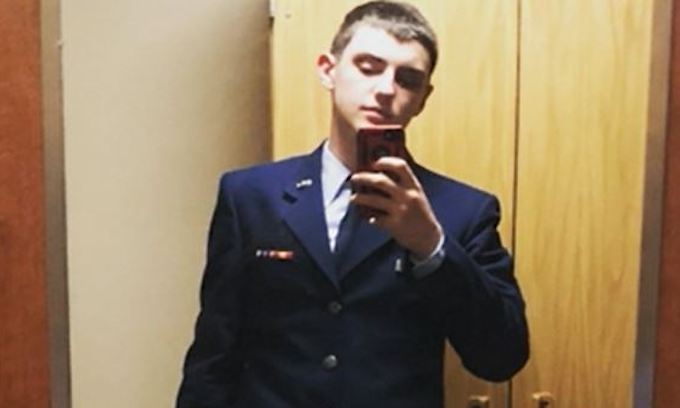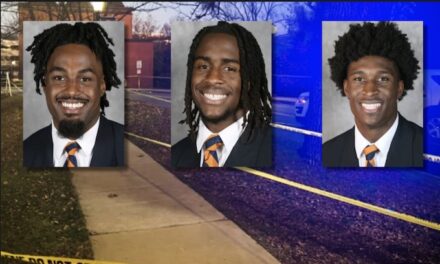The 21-year-old Air National Guardsman accused of leaking classified military documents faces a second hearing Friday to determine whether he will remain in federal custody as he awaits trial on national security-related charges.
Jack Teixeira, who has been locked up since his arrest on April 13, is scheduled to appear in U.S. District Court in Worcester, Mass., at 3:30 p.m. EDT Friday.
Teixeira has yet to enter a plea.
He faces at least 25 years in prison if convicted on multiple violations of the U.S. Espionage Act, including unauthorized retention and transmission of national defense information and unauthorized removal and retention of classified documents or material.
The latest hearing comes as prosecutors filed new court documents this week that revealed Teixeira had been reprimanded by Air Force commanders twice last year after he was observed mishandling U.S. secrets by stashing notes in his pocket and seeking specifics during a top-secret meeting where he was serving only in a technical capacity.
In both September and October, Teixeira was ordered in writing “to no longer take notes in any form on classified intelligence information” and to “cease-and-desist on any deep dives into classified intelligence information.”
After the warnings, prosecutors allege Teixeira bragged to friends that he knew his actions were “breaking a ton of” laws but “Idgaf what they say I can or can’t share.”
In light of the new information, prosecutors wrote Teixeira “will be undeterred by any restrictions this court places upon him and will not hesitate to circumvent those restrictions if he deems it in his interest to do so,” prosecutors contended.
During the first detention hearing on April 27, Judge David Hennessy said he needed more time to review the case before making a decision on whether to grant bond.
At the time, prosecutors argued Teixeira was a flight risk, while highlighting the national security risks and noting the extreme pressure of the case as well as the defendant’s lack of finances, which could ultimately expose Teixeira to foreign agents seeking to sneak him out of the country.
They also expressed doubt that Teixeira would adhere to the judge’s bail conditions.
“What makes anyone think that his signature on a piece of paper saying, ‘I promise I won’t do anything to violate my conditions,’ actually means anything?” Assistant U.S. Attorney Nadine Pellegrini told the judge previously.
During the same hearing, Teixeira’s public defender Allen Franco argued Teixeira never intended for the secrets to be widely disseminated and asked the judge to release his client to the custody of one of his parents or to his superiors at the Air Force, who would be responsible for confining him until trial.
Teixeira’s father also testified that he would serve as a custodian for his son if he made bail.
Legal experts said they expect the judge to order Teixeira to remain in custody before trial, which was likely more than a year away given the gravity of the charges.
“Here’s someone who was willing to steal from the government and distribute classified information without taking a lot of steps to cover his tracks,” said former Massachusetts U.S. Attorney Andrew Lelling. “There’s a reckless quality to it, and you don’t know what else he has.”
Teixeira worked in government intelligence as a cyberdefense operations journeyman, giving him access to the top-secret documents that first appeared on the social gaming platform Discord, which Teixeira regularly used, as early as December.
The documents he allegedly shared revealed covert information about pressing national security matters, including Russia’s invasion of Ukraine, but the military was unaware of the leak for months before it launched an investigation on April 7.
Teixeira was taken into custody a week later by the FBI outside his mother’s home in Dighton, Mass., where he lived.
Inside the house, investigators found a smashed laptop, tablet and gaming console, and a gun locker containing an arsenal of high-powered weapons and tactical gear.
The case has sparked increasing outrage in Washington and raised serious questions about the way the nation’s secrets are safeguarded.
When the leak first came to light in media reports, federal authorities said Teixeira attempted to cover his tracks to confuse investigators, while instructing members of his group chats to “delete all messages.”
Prosecutors have also submitted into evidence more than 40,000 messages that Teixeira sent to others about the documents, including conversations in which he offered national secrets to his pals and bragged about his potential to carry out a mass casualty event.
Copyright 2023 United Press International, Inc. (UPI). Any reproduction, republication, redistribution and/or modification of any UPI content is expressly prohibited without UPI’s prior written consent.
—-
This content is published through a licensing agreement with Acquire Media using its NewsEdge technology.



















HE is gonna get every thing including the kitchen sink, tossed at him.. BECAUSE HE Did the naughty..
REVEALED ALL THEIR LITTLE SECRETs.
How dare he!
If he was trans like Chelsea Manning or a Biden he would have no charges and be free.
OR like that clothes stealing nuclear thing..